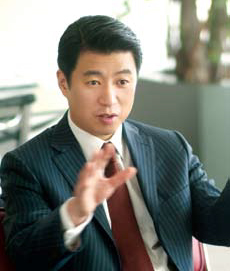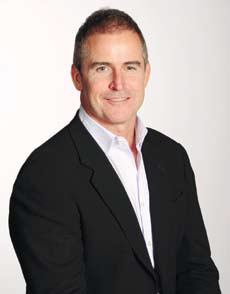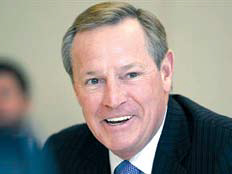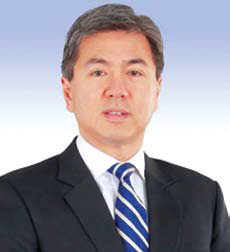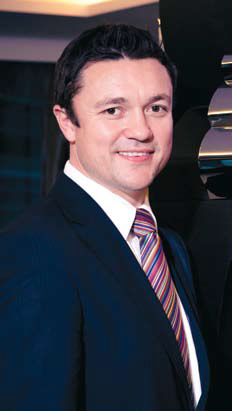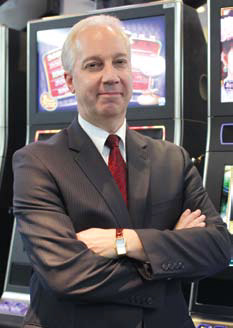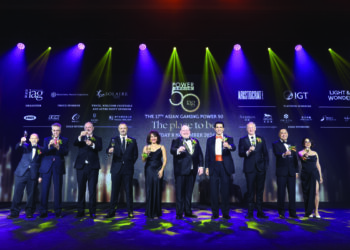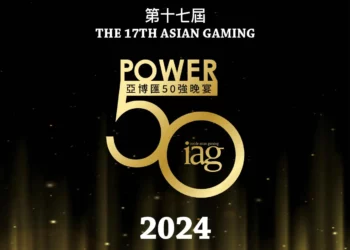31 Constance Hsu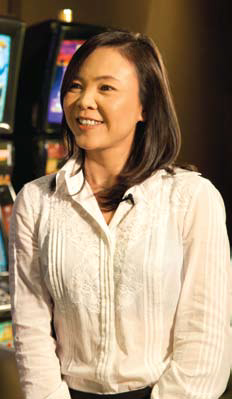
President
Mocha Clubs
Before Mocha Clubs opened its first venue in 2003, slot machines in Macau were viewed as merely decorations at the table dominated casinos. Worse, they were seen as a bad gamble, “hungry tigers,” as they were called in the local Cantonese dialect. Mocha has worked hard to shake off that perception, showing Chinese players that slots are not only fair but also offer strong entertainment value.
As Constance Hsu explained recently to Inside Asian Gaming: “There are several cultural explanations for the erstwhile aversion to slots in Macau, such as the supposed preference of Chinese to engage in intense face-to-face battles against the house and their belief that they can influence outcomes at tables by spotting patterns and picking lucky cards or numbers, whereas when they play slots they leave their destinies to unfeeling computers. However, from our point of view, the main reason for the previous non-performance of slots in Macau was a lack of quality product offerings, service and comfortable ambience.”
Mocha Clubs, owned by Macau casino operator Melco Crown Entertainment, has helped to redress that, creating a chain of locals-focused venues offering cozy, coffeeshop style surroundings, a slick player rewards scheme and one of the best returns to player on its machines in the whole of the city. The company’s keen attention to service and local game preferences has allowed it to compete in the face of fierce competition from the slot floors of Macau’s glitzy resort casinos.
As president of Mocha since 2008, Ms Hsu has overseen the company’s expansion to 2,100 machines across 10 venues. The latest financial results appear to suggest the expansion may have been a bit too rapid, cutting into the company’s win per unit. Net revenue in the second quarter totaled US$35.1 million, up 8% from $32.4 million in the same period last year. But that’s on 500 additional machines over the 1,600 in operation in 2Q 2011, which translated to a diluted win per unit per day in 2Q12 of $181 versus last year’s $226. However, the company’s installed base will come down when its Marina Plaza location closes in line with a new government policy aimed at curtailing gaming in predominantly residential areas. Once that venue shuts, taking more than 300 machines offline, some of those customers will naturally head to other Mocha outlets, pushing up overall win per unit across what will be a smaller total installed base.
Interestingly, Mocha appears intent on branching out from its locals focus and is seeking further opportunities to work as a third-party slot operations manager within existing casinos, a business model launched in January at Casino Golden Dragon, one of SJM’s third-party-owned “satellite” casinos. Mocha also seems to be going after more tourists. Mocha Macau Tower, which opened at the waterfront tourist landmark in September last year, features several games chosen specifically for their potential appeal to out-of-towners.
Given the constraints of the regulatory environment, as well as Macau’s limited land area and population, initiatives such as these will be important to Mocha’s growth going forward, and under Ms Hsu’s steady leadership, very likely to succeed.
32 Philip Chun
Chairman and CEO
Paradise Group
The South Korean government legalized foreigners-only casinos in 1967, and for most of the ensuing four decades, Paradise Group dominated the market.
In 1968, the company opened what is still the country’s best-known casino at the Sheraton Walker Hill Hotel in the capital of Seoul. Paradise now operates five foreigners-only venues, led by flagship Walker Hill containing 79 table games and 160 slot machines, and as recently as 2005 controlled an estimated 90% share of revenue in the sector. (The state-owned Kangwon Land opened to Korean nationals in 2000.) It lost that lead, however, following the government’s decision in 2005 to set up its own casino operating company, Grand Korea Leisure, under the auspices of the Korea National Tourism Organisation, with a remit to boost tourism and generate income to fund tourism infrastructure and other government projects. GKL opened three casinos—two in Seoul and one in the port city of Busan—under its Seven Luck brand in 2006, and by 2010 had grabbed an estimated 54% of a foreigners-only market worth just over KRW1 trillion (US$885 million). As the market expanded to 17 casinos in all, Paradise’s share contracted to around 30%.
Philip Chun, chairman of Paradise Group since 2004, has led a remarkable turnaround over the past two years. He had his company’s share of the foreigners-only market back up to 50% in the second quarter of 2012 on a 25.7% year-on-year increase in revenue, while GKL’s share dropped to 42%.
A big factor in Paradise’s favor is that it is relatively more reliant on Chinese visitors, while its competitors depend more on Japanese patrons whose consumer spending overseas has been battered by an overvalued yen. Paradise also enjoys an additional revenue stream from its ownership of the largest casino in Kenya, the Paradise Safari Park & Casino with 40 tables and around 100 slots.
But Mr Chun’s biggest challenge may lie ahead if the government moves forward with an expected liberalization scheme tied to the 2015 expiration of Kangwon Land’s exclusive license to serve Korean nationals. It’s probable that at least one more license will be issued for the domestic market, and permission might also be granted for the development of up to five integrated resorts targeting the tourist market—a significant trade-up from the relatively modest venues operated by Paradise and GKL.
For Paradise it means both opportunity and risk. If it manages to secure a license to serve domestic players and/or the rights to build one or more of the IRs, the group’s commercial prospects would dramatically improve in the medium to long term. Set against that is the risk that the government could open the country to foreign casino companies with proven track records in running IRs—in the way Macau and Singapore did—which could pose a serious competitive threat to both Paradise and GKL.
33 Larry Mullin
CEO and Managing Director
Echo Entertainment Group
In October 2007, Tabcorp’s Casinos Division—spun off by the Australian betting giant last year to create Echo Entertainment— was granted a 12-year extension on its exclusive right to operate a casino in Sydney. Shortly thereafter, Tabcorp announced plans to completely make over its Star City casino, a down-market property that lagged far behind rival Crown Melbourne in drawing high rollers despite its location in the country’s largest and most cosmopolitan city.
The bulk of the refurb, costing A$870 million (US$918 million) and encompassing a new five-star hotel, more restaurants and bars and improved gaming and entertainment facilities, came online under Echo last September, and the venue has been renamed The Star. The transformation notably includes the reorientation of the building to face Sydney Harbour and the city’s skyline and the conversion of its own piece of harbor frontage into a luxury marina. In an attempt to draw more international VIP players, Echo has also acquired private jets and equipped the villas at its new luxury hotel, The Darling, with their own private gaming salons.
Larry Mullin was recruited in early 2009 to oversee the revamp, as well as an A$625million upgrade of Echo’s three casinos in Queensland. He is ideally suited to manage the company’s repositioning. In his previous role as president and COO of The Borgata in Atlantic City he led the effort to establish that property as one of the premier gaming destinations in the United States and inject fresh blood into what was then a decidedly stale gaming market.
Roughly 80% of Echo’s investment in The Star is on non-gaming amenities, which according to Mr Mullin “create the energy that people who like to gamble feed off”. It’s that energy that helped establish The Borgata as Atlantic City’s top grossing casino, and to provide it, in addition to elegant surroundings and high-quality F&B, he believes it’s also vital to offer world-class entertainment. Mr Mullin—who has the likes of Bon Jovi and Elton John on his speed dial—was renowned for bringing a string of A-list performers to Atlantic City, and he has started doing the same at The Star.
Echo’s mission to move its properties up-market and attract more high rollers— who now throughout the world are predominantly Chinese—is already paying dividends. Prior to the makeover, Echo’s share of the Australian VIP market had hovered around 20%, with Crown commanding the rest. Echo’s share of the VIP business has since risen to 36% on a normalized basis in the financial year ended 30th June. With Echo increasingly giving Crown a run for its VIP money, James Packer’s eagerness to take the company over may have a defensive rationale, at least in part.
Earlier this year, The Star was hit with a fair bit of negative publicity relating to “leaks” purporting to reveal drug use among senior executives and general bad behavior, as well as the dismissal of its then-managing director following an internal investigation into allegations that he had sexually harassed two female managers at the casino. Although an investigation by the New South Wales gaming regulator exonerated The Star and its management, and concluded that the company’s internal investigation and subsequent dismissal of the MD had been conducted “promptly, properly and thoroughly,” the bad press has clearly had a deleterious effect on Echo’s business, especially in light of weak consumer demand in both its Australian and overseas markets, and tarnished an otherwise brilliant revival.
34 Rowen Craigie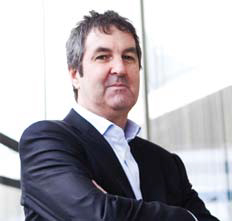
CEO and Managing Director
Crown Ltd
Australia’s casino industry has been battling some severe economic headwinds in the form of weakening consumer sentiment at home and increased competition in the greater Asia-Pacific region, most recently from the new integrated resorts in Singapore, but Rowen Craigie continues to lead his Crown casino group to solid results.
The company saw net profit in fiscal 2012 increase 53% year on year to A$513.3 million and normalized profit, which Crown says best reflects its performance, increase 22% to $415 million.
Significantly, given the re-energized competition from Sydney rival Echo Entertainment, the company managed to grow normalized revenues 8.9% at its two properties, its flagship Crown Melbourne and Burswood in Perth, to $2.63 billion, with normalized EBITDA up 5.1% to $736.9 million.
Margins in the company’s all-important VIP division have been challenged, a factor of the increased competition both at home and abroad, and by a changing client mix and higher taxes in Melbourne—still, revenue at the high end was up 19% year on year.
“Our strategy to source new customers from China also continues as we seek to offset the ongoing impact of the Singapore integrated resorts on our VIP business,” Mr Craigie said in a statement accompanying the 2012 results. The bottom line also got a boost from a share of the profits from Crown’s Melco Crown Entertainment joint venture in Macau, which topped A$135 million this year compared with $34.9 million in fiscal 2011.
In Australia, Crown is ramping up its attractiveness to overseas tourists and gamblers, as well as to domestic holiday and business travelers. Last month, plans were announced for a new $568 million luxury hotel at the Burswood complex. The company is also looking to develop a highend resort-scale casino in Sydney, possibly in partnership with Echo, whose Star casino on Darling Harbour holds an exclusive license in New South Wales through 2019. Crown owns 10% of Echo and has applied to NSW regulators to increase its stake.
As CEO and managing director, Mr Craigie oversees all of the company’s Australian and international gaming operations. He is a director of the Melbourne and Burswood operating companies and a director of Melco Crown Entertainment (Macau) and Aspinalls Holdings (Jersey), through which Crown owns and operates London’s famed Aspinalls Club, which generated normalized EBITDA of A$20.6 million in 2012. He joined Crown Melbourne Ltd in 1993 and was appointed executive general manager of its gaming machines department in 1996. He was promoted to chief operating officer in 2000 and served as CEO from 2002 to 2007.
35 William Weidner
Chairman and CEO,
Global Gaming Asset Management
President and CEO, Weidner Resorts
As Sheldon Adelson’s right-hand man for more than a decade, Bill Weidner helped build Las Vegas Sands Corp from an operator of a single casino on the Las Vegas Strip into an international gaming powerhouse. Mr Weidner served as president and COO of LVS from August 2004 to March 2009, during which time he was instrumental in both the company’s entry into Macau and its successful bid to secure a license to operate an integrated resort in Singapore.
Mr Weidner left LVS in 2009 in the midst of the global financial crisis that almost sank the company, reportedly as a result of deep disagreements with Mr Adelson, and is now seeking to make his own mark on the Asian gaming landscape. In 2010, he formed Global Gaming Asset Management in Las Vegas together with three former senior executives of LVS. Last November, the group concluded a management agreement in the Philippines with Bloomberry Resorts Corp to oversee operations at the US$1 billion Solaire Manila, one of four integrated resorts planned for the new Entertainment City Manila and scheduled to open in the first quarter of 2013. Phase 1 of Solaire Manila will feature 27,700 square meters of gaming space with 1,200 slots and 300 table games.
Mr Weidner also has his sights set on his own integrated resort on the Taiwanese island chain of Matsu, where a recent referendum paved the way for possible casino development. Weidner Resorts, established in January 2011, has unveiled plans for a NT$60 billion (US$2 billion) project that aims to capitalize on Matsu’s location near China’s east coast, just 10 miles from Fujian. Mr Weidner predicts Matsu can generate gaming revenues of NT$10 billion per year.
Whether a casino on Matsu will come to fruition, however, is far from clear. Matsu lacks basic infrastructure and comes with high political risk. In order for an integrated resort to be viable there it would need to draw visitors from mainland China, but Beijing is not likely to grant its citizens unfettered access to a casino in Taiwan.
Even if bidding is eventually opened for a Matsu IR, despite Mr Weidner’s unquestioned credentials and first-mover advantage, Weidner Resorts would still have to bid against larger and more established operators—including his former employer— should they get involved.
36 Kingson Sian
President
Travellers International Hotel Group
With Resorts World Manila, Travellers International—a joint venture between Alliance Global and Genting—has created something of a sensation. Despite the Filipino love of gambling, major casinos run independently of the government operator-cum-regulator, the Philippine Amusement and Gaming Corporation, had never succeeded in the Southeast Asian archipelago. But Travellers, led by Kingson Sian, proved the naysayers wrong with a world-class venue, and is now planning to expand with an even larger one.
“Their success was completely unexpected,” says a Manila-based head of equity research. “There had been many attempts by private-sector groups to run casinos in the Philippines as far back as the early ’90s, and they all failed miserably. When these guys started operating in 2009, there was absolutely no history for anyone to suggest they would succeed this time, and yet they did, and they completely blew my expectations out of the water.”
Resorts World Manila opened at the height of the global financial crisis and has sustained an enviable performance since then. In 2011, RWM generated US$659 million in net revenue (accounting for more than 40% of total gaming revenue in the Philippines) and $214 million in EBITDA, which works out to a nearly 40% return on investment.
Travellers is planning to build on that success with Resorts World Bayshore City— a themed development which, apart from gaming, will include 2,500 hotel rooms and employ tens of thousands of Filipinos directly and indirectly.
The company has played an important role in bringing the largely informal gaming culture of the Philippines out into the open. But the country continues to present problems for gaming developers with global ambitions.
“The big challenge for Resorts World and big casino operators, if they’re truly going to go for the junket market, is just simple infrastructure,” says the research head. “At the moment, [Ninoy Aquino International Airport] is already overloaded, and they’re trying to push as many non-big commercial flights off, just because one small plane and one large plane take the same amount of time and the same slot on the runway.”
Rumors of private solutions abound— such as a dedicated terminal for high rollers—but nothing officially sanctioned has been announced as of yet.
Mr Sian’s challenge will be to use his influence with the government and other private-sector players to help resolve the infrastructure situation and enable the Philippines to realize its potential as a hub for domestic and international gaming.
37 Gregory S. Gronau
President and CEO
Gaming Partners International
Since 1925, Gaming Partners International has provided the first line of defense for casinos in ensuring that cheaters never prosper at their tables. The company has earned its position as the leading supplier of gaming chips, plaques and jetons throughout the world, including Asia’s biggest gaming markets, by tirelessly innovating to stay ahead of ever-resourceful counterfeiters.
Under Greg Gronau’s leadership, GPI has been securing increasingly large orders in Asia on the back of the explosive growth of the last decade in the continent’s table game volume. In addition to offering market-leading security, GPI also strives to enhance the aesthetic appeal and value of its products as marketing tools. The company’s recently introduced B&G Premium Chips, for example, give casinos the ability to create unique chip designs that combine up to six colors with logos and other brand elements.
B&G’s products are widely considered the industry’s most prestigious casino currency and are staples at VIP gaming rooms in Asia and worldwide. GPI also supplies chips under the well-known Paulson and Bud Jones brands. The company operates high-security, high-capacity manufacturing facilities in Mexico and France and supplies other table game equipment as well, including furniture and accessories, layouts, playing cards, dice and roulette wheels.
Mr Gronau has been GPI’s chief executive since September 2009, having served as the company’s COO and executive vice president for almost a year prior to that. He has more than 20 years of senior management experience leading gaming and manufacturing companies to profitable growth and expansion.
In 2010, Mr Gronau oversaw an agreement with International Game Technology to license radio frequency identification (RFID) tracking technology for casino currency which the US-based slot giant had purchased from now-defunct Progressive Gaming International. These new RFID solutions include chips, readers and displays, which help operators improve both security and efficiency. GPI’s latest product offering, RFID Total Money Management, combines the efficiencies of RFID with a high-speed bill validator for table games designed by JCM, streamlining table game cash and chip transactions to enable sizable increases in hands per hour while providing increased security through instant authentication and validation.
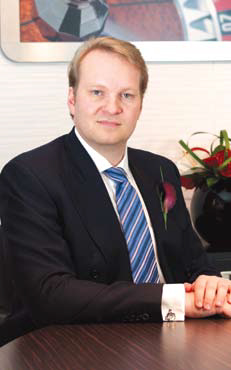
38 Tristan Sjöberg
Executive Chairman
TCSJOHNHUXLEY
TCSJOHNHUXLEY is in full growth mode in Asia with a new team and new technologies promising to maximize performance and profitability in Asia’s table centric gaming markets.
The global manufacturer and supplier of live gaming products is restructuring its technical services and support network in the region, expanding its warehouse facilities and bulking up its offices in Macau and Singapore with a number of fresh faces in sales and marketing.
The company’s heightened focus on Asia comes from the top down. In July, Tristan Sjöberg took up the role of executive chairman of the UK-based company, relinquishing his former title of managing director Asia. Mr Sjöberg remains based in Singapore and has placed Rebecca Kingswell in charge of day-to-day running of Asia operations. The company’s November 2011 appointment of Cath Burns—Bally Technologies’ widely respected former head of Asia-Pacific—as global CEO has also gained it valuable regional know-how to further its ongoing Asia expansion.
That expansion began in earnest when Mr Sjöberg relocated to Singapore from London at the start of 2009 and got involved in the long-term development of manufacturing, sales, service and support capabilities in Asia. In addition to supplying leading casinos in Macau and Singapore, TCSJOHNHUXLEY has also completed major projects at the Savan Vegas casino in Laos, NagaWorld in Cambodia and Kangwon Land, currently the only casino in South Korea available to Korean nationals.
Under Mr Sjöberg’s leadership, TCSJOHNHUXLEY has developed a policy of sourcing materials regionally where possible and has assembled a talented pool of technical development staff. Furthermore, through its offices in Macau and Singapore the company has learned a great deal about the needs and preferences of Asia’s casino operators and players and has recently come out with a number of applications tailored specifically for the region. Among its most recent releases is Gaming Floor Live, a realtime game-optimization tool designed to maximize performance and profitability in key areas on the floor.
39 Kurt Gissane
Managing Director, Asia-Pacific
Bally Technologies
Kurt Gissane was promoted to his current position in November last year, taking over the title previously held by the widely respected Cath Burns, who has moved to London to assume her new role as Global CEO of TCSJOHNHUXLEY. Mr Gissane now manages Bally’s day-to-day business operations and customer relationships throughout the region.
Mr Gissane has lived and worked in Macau since early 2005, witnessing firsthand the breakneck pace of development of the local gaming industry since the arrival of the first post-monopoly casinos in 2004. He joined Bally in 2009 and previously served as the company’s director of Sales and Operations for the region. Prior to joining Bally, he worked nine years at Aristocrat.
Mr Gissane’s abilities led to him being invited into Bally’s President’s Club for outstanding sales in his first two years with the company. He is well-known for his commitment to forging strong relationships with customers, which no doubt has contributed to his success over the years. The basis of those relationships is “transparency and mutual respect,” as he explained recently to Inside Asian Gaming. “I think rather than looking at it as a selling operation, it’s about forming true business partnerships, long-term partnerships, and that’s very important for me and the Bally team. That’s very important in this day and age. We’re a provider of systems, games, and now mobile and online gaming business solutions through our new Bally Interactive division. We’re advisors to our partners in the interests of improving their operational efficiency or helping them increase their revenues.”
Bally is in the process of becoming more Asia-focused, recently releasing several games designed specifically for the region’s markets and setting up a dedicated game development team based in India.
Mr Gissane and the Macau office have been providing significant input to that development team, and the fruits of their labor should boost Bally’s Asia profile over the coming year.
40 Mark Michalko
Sales Director
IGT-Asia
Mark Michalko took over as sales director for IGT-Asia earlier this year with a remit to turn around the slot giant’s fortunes in a part of the world the company views as a key to its continued growth outside its home markets in the US.
For Mr Michalko it’s meant creating and implementing a new strategic plan and revamping the sales team with a view to revitalizing commercial models that haven’t served IGT as well as they might have in terms of floor share in the region, particularly in Macau.
The buzz word for IGT is “market-attuned,” which means a lot of things, but can be distilled down to the recognition that an appealing package, while important, doesn’t cut it if the game mechanics, the math and the cultural context aren’t all sound. It means garnering the ability to understand local tastes and preferences in some profound ways. In Macau, principally, IGT has been engaged in months of consumer research— some of the most intensive research casinos in this part of the world have been party to. Mr Michalko’s job, in essence, has been to build on the momentum by solidifying the relationships that have emerged from engaging the company’s new operator partners at every stage of the game development process, and by positioning the new sales team to be as close as possible to their customers.
Needless to say, it’s required both a seasoned, thoughtful approach to administration and a decisive hand in execution, traits Mr Michalko has cultivated in abundance.
A 35-year industry veteran, he was founding executive director of the California State Lottery. He went on to head commercial ventures centered on IT services in gaming and in biotechnology and media and served at one point as president of publicly listed International Lottery & Totalizer Systems.
IGT especially values his experience on the ground in Asia, where he was the first managing director of PGMC, the listed company licensed by the government of the Philippines to operate its national online lottery, and served for three years as president and director of the Hong Kongbased Asian subsidiary of lottery giant Intralot.
If it would be premature to call this year’s G2E Asia a defining moment for him, for certain, it was an important first look at his effectiveness in positioning IGT to take some floor share in the months ahead. By all accounts, it’s been a promising debut.
Next: The Asian Gaming 50 – 2012: 41-50







